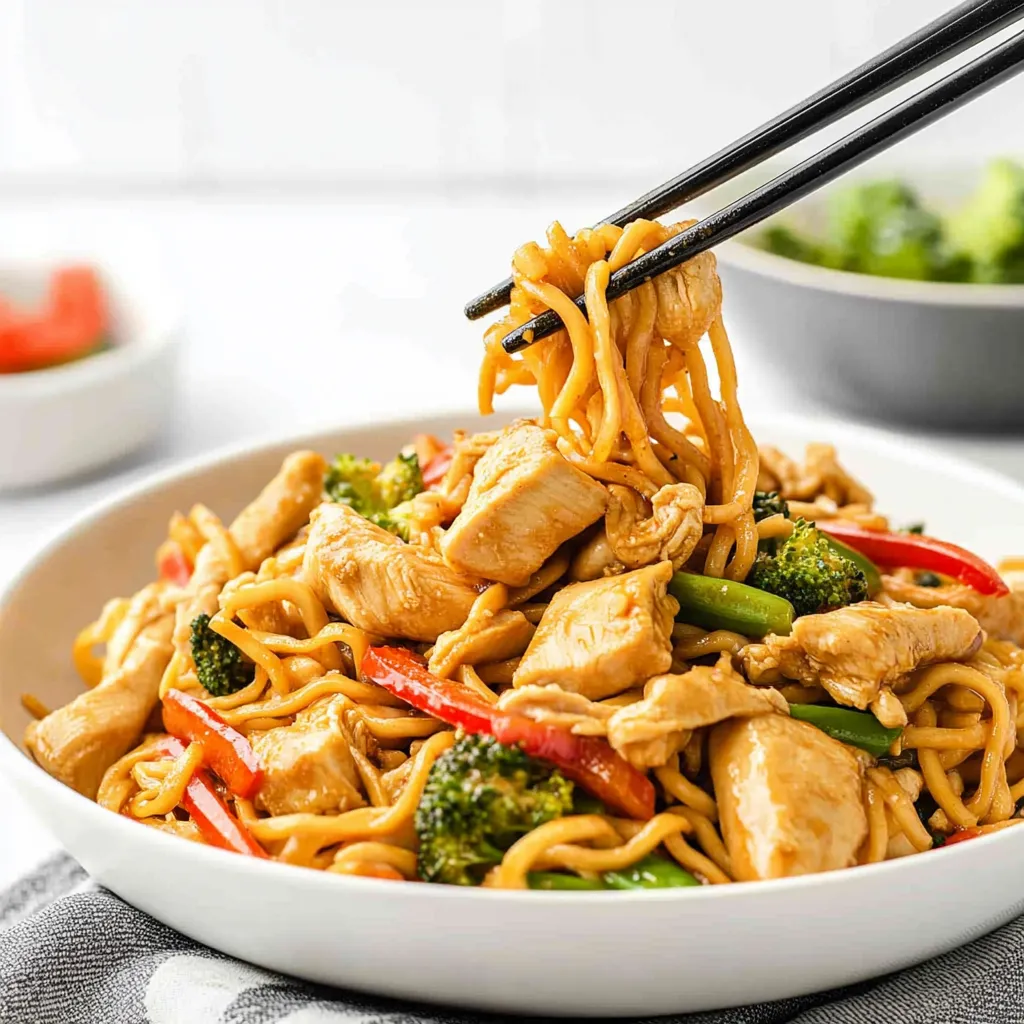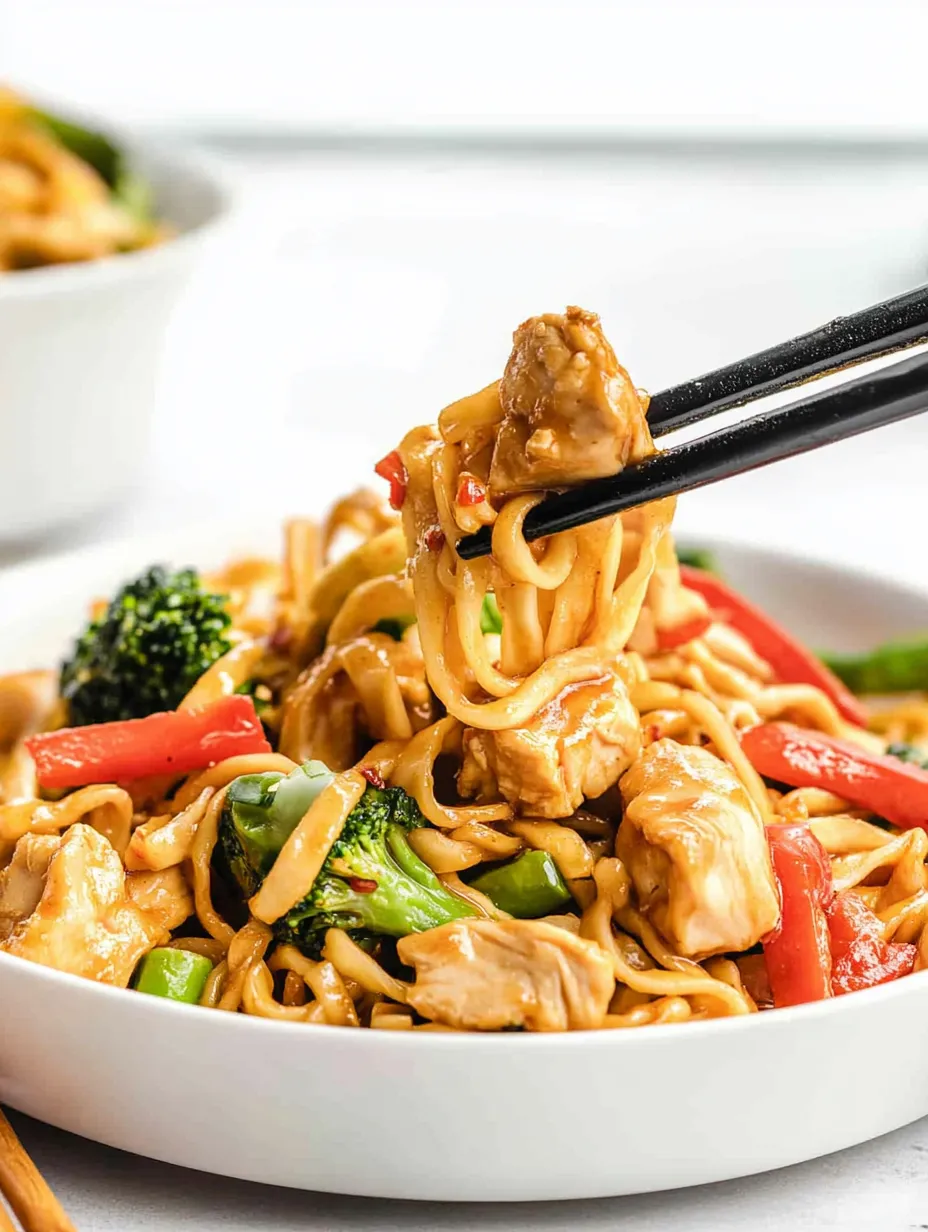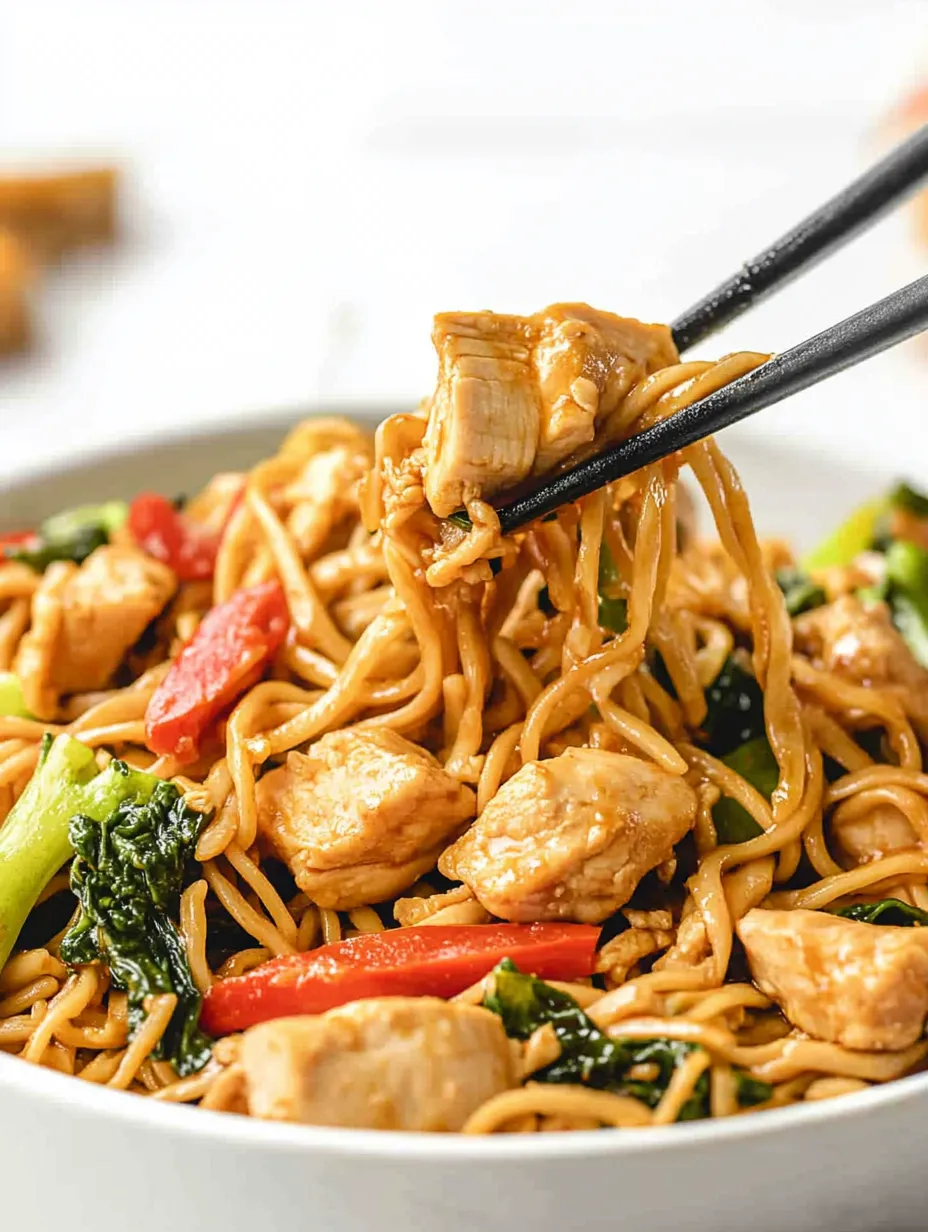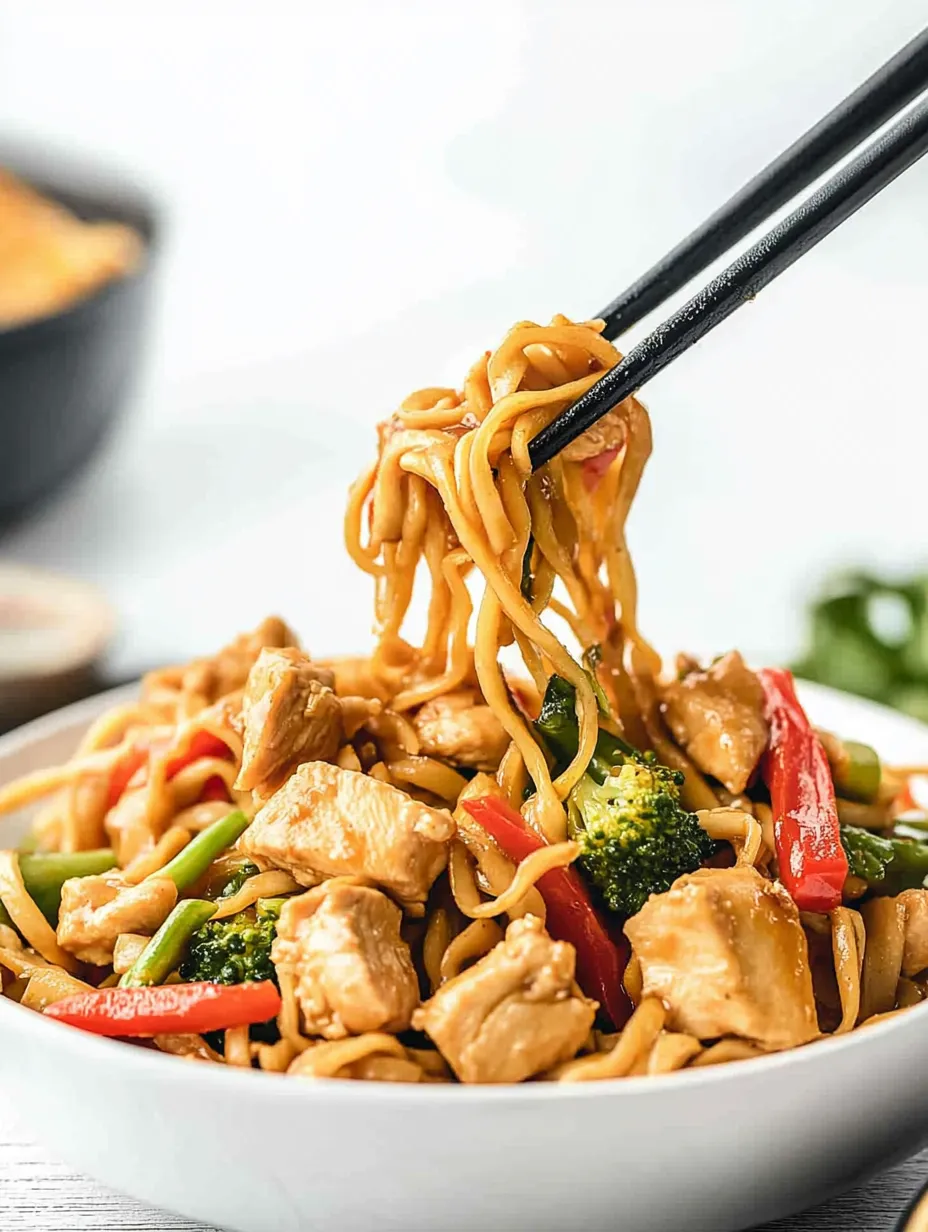 Pin it
Pin it
Homemade chicken lo mein transforms familiar takeout flavors into something remarkably fresher and more satisfying. This simple stir-fry combines tender chicken pieces, crisp vegetables, and chewy noodles with a savory sauce that coats every strand and morsel. The beauty lies in its balance—savory depth from soy and oyster sauces, subtle sweetness from brown sugar, and aromatic complexity from fresh ginger and garlic. Best of all, this complete meal comes together faster than delivery would arrive, making it perfect for busy evenings when cravings strike.
Last weekend I made this for my sister who constantly orders Chinese takeout. After her first bite, she looked up with genuine surprise and asked for my secret. When I explained how simple it was, she immediately started planning which vegetables she would use for her own version. Now she texts me weekly with her latest lo mein creation, each one slightly different but always delicious.
Ingredient Intelligence
Noodle Knowledge
- Authentic Chinese egg noodles: Offer ideal chewiness and excellent sauce absorption capability
- Look for packages labeled "lo mein" or "Cantonese style": For traditional texture and flavor
- Fresh noodles: Cook significantly faster than dried varieties while providing superior texture
Protein Perfection
- Chicken breast cut against the grain: Ensures maximum tenderness in the finished dish
- Uniform cutting size: Creates consistent cooking for perfectly juicy results
- Room temperature chicken: Browns more effectively than cold pieces straight from refrigerator
Vegetable Vibrancy
- Different cutting techniques: Create varied textures throughout the dish
- Staggered cooking times: Allow each vegetable to reach optimal doneness
- Fresh ginger: Should feel firm without soft spots when gently pressed
 Pin it
Pin it
I discovered through experimentation that marinating the chicken for even just 10 minutes in a tablespoon of the sauce mixture dramatically improves flavor penetration. This small step separates good homemade lo mein from truly exceptional versions. My grandmother taught me to test ginger freshness by scratching the skin slightly—truly fresh ginger releases an immediate aromatic scent that indicates peak flavor potential.
Complete Cooking Method
Sauce Creation
Combine one-half cup chicken broth, three tablespoons soy sauce, one tablespoon hoisin sauce, one tablespoon oyster sauce, one teaspoon cornstarch, two cloves minced garlic, one tablespoon brown sugar, one tablespoon fresh grated ginger, and one-quarter teaspoon black pepper in mixing bowl. Whisk thoroughly until cornstarch completely dissolves and ingredients fully incorporate. Set aside to allow flavors to meld while preparing remaining components.
Noodle Preparation
Bring large pot of water to rolling boil over high heat. Add eight ounces lo mein noodles to boiling water, stirring immediately to prevent sticking. Cook noodles according to package directions until just barely tender, maintaining slight firmness. Drain thoroughly in colander then rinse briefly with cool water to halt cooking process. Toss lightly with teaspoon of neutral oil to prevent sticking while completing remaining steps.
Protein Cooking
Heat large wok or skillet over medium-high heat until water droplets evaporate immediately upon contact. Add one tablespoon vegetable oil and swirl to coat cooking surface evenly. Add one pound thinly sliced chicken breast in single layer without overcrowding. Allow chicken to sear undisturbed for one minute before stirring. Continue cooking while stirring occasionally until chicken pieces show no remaining pink, approximately three minutes total. Transfer chicken to clean plate, maintaining any residual juices.
Vegetable Orchestration
Return wok to heat and add remaining tablespoon vegetable oil plus one teaspoon sesame oil. Add julienned carrots and sliced onions first, cooking while stirring constantly for two minutes until onions begin turning translucent. Add diced red bell pepper, broccoli florets, and sugar snap peas to wok. Continue stir-frying for three additional minutes until vegetables develop vibrant color while maintaining pleasant crispness. Incorporate remaining minced garlic and grated ginger directly into vegetable mixture, stirring continuously for thirty seconds until fragrant.
Final Harmony
Pour prepared sauce mixture over vegetable medley in steady stream while stirring constantly. Continue cooking while stirring for approximately one minute until sauce begins visibly thickening. Return cooked chicken with accumulated juices to wok, stirring to incorporate thoroughly with vegetables and sauce. Add prepared noodles to wok, using tongs or two utensils to gently lift and turn all components together until noodles completely coat with sauce and ingredients distribute evenly throughout dish. Remove from heat once everything reaches uniform temperature, approximately one additional minute.
My culinary school instructor emphasized the importance of "mise en place" (everything in its place) particularly for Asian cooking. The first time I attempted this recipe without proper preparation, I ended with overcooked vegetables while frantically chopping the next ingredient. Now I arrange everything in small bowls before heating the wok, making the actual cooking process remarkably stress-free.
 Pin it
Pin it
The distinction between home-cooked and restaurant lo mein often comes down to timing. Most restaurants overcook vegetables to ensure rapid service, sacrificing texture and nutritional value. By cooking vegetables just until brightly colored and slightly tender, you preserve their essential vitamins and create more satisfying bite contrast. My father, who grew up in Taiwan, always says proper stir-fry should maintain the "essence" of each vegetable while bringing them together harmoniously.
Complementary Serving Ideas
Traditional Accompaniments
Create complete Chinese restaurant experience by serving alongside homemade crab rangoons with sweet duck sauce. Consider adding vegetable spring rolls with dipping sauce for appetizer course. Complete meal with fortune cookies either homemade or store-bought for authentic finishing touch.
Beverage Pairings
Balance the savory flavors with jasmine tea served in small traditional cups. For adult gatherings, consider light lagers or crisp white wines that complement without overwhelming the dish. Plum wine provides sweetness that contrasts beautifully with the savory sauce elements.
Presentation Enhancements
Serve family-style in large decorative bowl with serving tongs or chopsticks. Garnish with diagonal-sliced green onions and toasted sesame seeds for visual appeal. Provide small dishes of additional condiments like Chinese hot mustard, sweet chili sauce, and extra soy sauce for personalization.
Creative Adaptations
Protein Alternatives
Transform the dish by substituting thinly sliced beef sirloin for completely different flavor profile. Consider using jumbo shrimp for seafood variation that cooks even more quickly. Create vegetarian version by replacing chicken with pressed extra-firm tofu cut into cubes and seared until golden.
Vegetable Variations
Incorporate snow peas for additional crunch and vibrant green color throughout the dish. Add sliced water chestnuts for unexpected textural contrast within each bite. Consider baby bok choy for authentic Chinese green vegetable that wilts perfectly into the sauce.
Dietary Modifications
Create gluten-free version using rice noodles or spiralized vegetables instead of traditional wheat noodles. Reduce sodium content by using low-sodium soy sauce and homemade chicken stock without added salt. Increase protein content by adding scrambled egg strips for additional nutritional boost.
Keeping Freshness
Optimal Storage
Allow leftover lo mein to cool completely before transferring to airtight container. Store in refrigerator with tight-fitting lid to maintain moisture and prevent absorption of other food odors. Consume within three days for best flavor and textural quality.
Revitalization Techniques
Reheat refrigerated portions in wok or skillet rather than microwave for superior texture restoration. Add small splash of chicken broth during reheating process to refresh sauce consistency. Consider briefly stir-frying to recreate fresh-made quality rather than simply warming.
Freezing Fundamentals
Freeze individual portions in airtight containers for convenient future meals. Thaw overnight in refrigerator before reheating for most even temperature control. Add fresh garnishes after reheating to restore vibrant appearance and textural contrast.
 Pin it
Pin it
The discovery that transformed my lo mein forever came from an elderly Chinese neighbor who watched me cooking one evening. She suggested waiting until the wok was properly "smoking hot" before adding any ingredients, explaining that this crucial temperature creates "wok hei"—the distinctive flavor that restaurant cooking achieves. Following her advice, I noticed immediate improvement in both texture and taste, with vegetables that maintained perfect crispness while developing slight caramelization. This technique, combined with organizing ingredients in order of cooking time, creates restaurant-quality results that consistently impress even the most dedicated takeout enthusiasts.
Frequently Asked Questions
- → Can I use different vegetables?
- Yes, try bok choy, mushrooms, or bean sprouts based on preference.
- → What if I can't find lo mein noodles?
- Substitute with spaghetti, linguine, or ramen noodles in a pinch.
- → Is oyster sauce necessary?
- For authentic flavor yes, but can substitute with more hoisin sauce.
- → Can I make this ahead?
- Yes, keeps well for 3 days. Reheat in skillet with splash of water.
- → How do I make this spicy?
- Add sriracha, red pepper flakes, or fresh sliced chilies.
